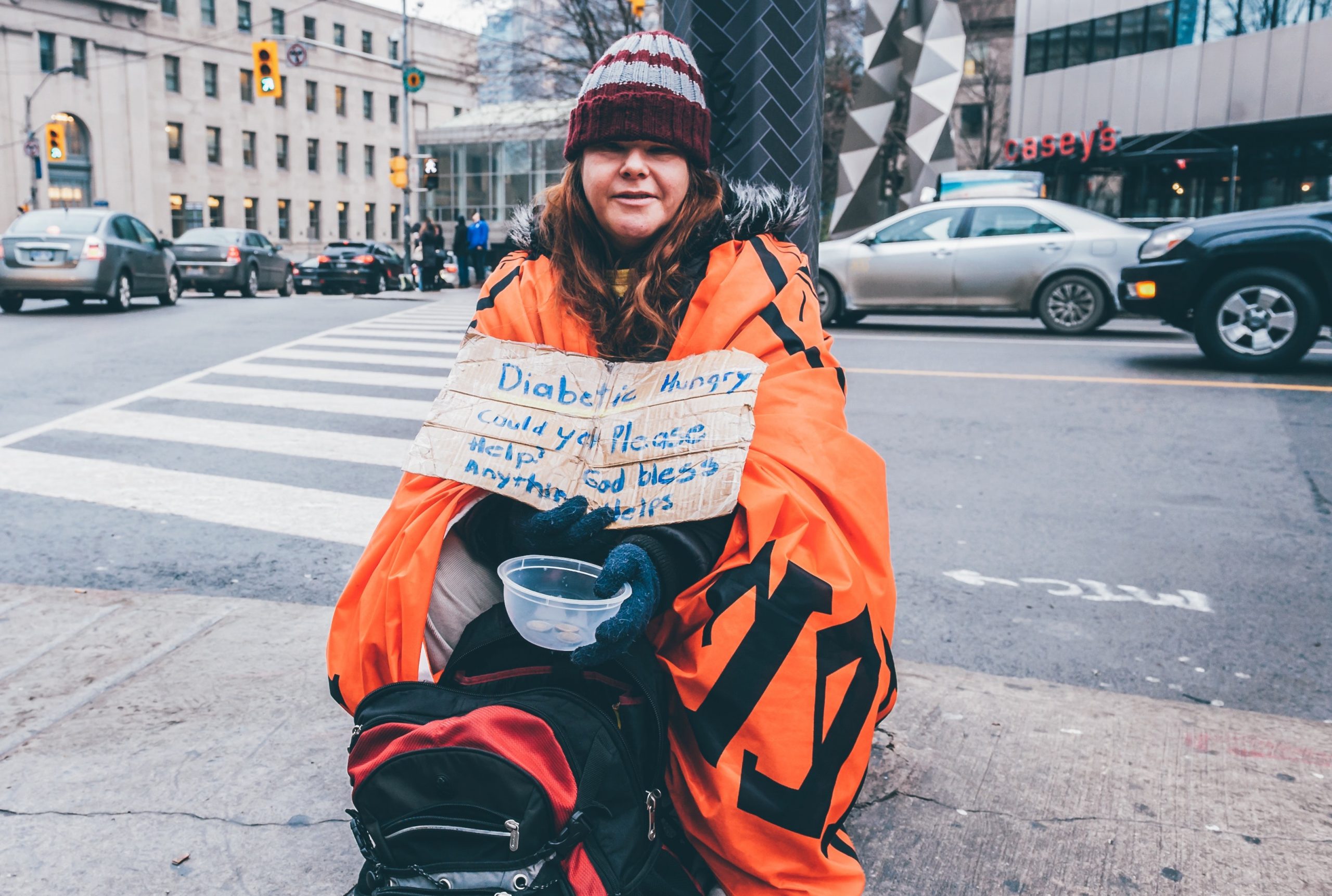As I was waiting behind a long line of traffic, I noticed two men dancing on the sidewalk, next to a parking lot.
One man looked as if he was singing, while the other was playing a violin that was hooked up to a portable speaker. The peculiar sight made me instantly smile and wonder, “What in the world are they doing there?”
I then saw a car leaving the parking lot. The driver stopped next to them, rolled down the window, and leaned over to hand the singing man something. Then it clicked, the driver was giving them money.
The dancing men were panhandling.
At first, I applauded them for being creative. Performing music was a clever and unique way to earn the money they were begging for.
But then, I suddenly felt sad, and immediately after that, I felt angry. I was heartbroken for the men. I was pissed at our unfair and broken system for forcing them to have to perform on a busy corner, praying for kind citizens to notice and take pity on them.
Feeling certain they weren’t choosing to beg for money in the streets, I had no doubt something awful must have happened to them. Were they two of the nearly 600,000 fellow Texans who’ve lost their jobs in the last year due to the COVID-19 pandemic?
When the light turned green, I decided to turn around and go give them something.
When I pulled up beside the street performers, I realized that they weren’t both men. The singer was a teenager—only a boy. I wondered if they were father and son. As I leaned toward my window, the boy, who was dressed in a blue blazer and brown slacks, reached in and took the cash.
I couldn’t help but notice his dark hair and brown skin, or the older man with a graying beard spilling out of his face mask, while dancing and playing Spanish melodies on his violin. It is known that job losses caused by the pandemic have disproportionately affected Latin-Americans and other communities of color.
Was I witnessing that statistic before my eyes?
After leaving them, I pondered if the men were homeless and started reflecting on my own feelings toward the homeless community. It dawned on me that this was the first time I’ve ever gone out of my way to help like that, and I wanted to know why.
I think there was a mind shift because the street performers were trying to earn the money they were begging for. I believe that fact is what drove my emotions and made me turn my car around to go give them something. I felt they deserved to be helped.
Why don’t I feel these strong emotions when I see other people in need of help?
Usually, whenever I see a panhandler, I either don’t have any cash with me or the bills I do have are too large to justify giving away. I always feel bad when I have nothing to give, but obviously, not bad enough to do anything about it.
Shamefully, I won’t even acknowledge the person. I’ll uncomfortably stare straight ahead as if I can’t even see them—as if they don’t even exist. I always drive away feeling like a privileged asshole.
If I don’t have any money, I could go get some and come back to help them, but I never do. Is it because deep down, I don’t believe they deserve it since they’re not working for it? Or because I think they’ll waste the money on drugs or alcohol? Is it a judgment of begging, or a judgment of making poor choices?
Do I believe asking for help has to be conditional?
I believe my apathy toward homeless people was shaped and influenced by my grandparents who helped raise me.
I remember riding in the car with my grandma and watching her give dog food away to a panhandler who regularly hung out at the intersection near her house. She refused to give money to the homeless person, but felt that the dog didn’t have a choice, so she couldn’t let him suffer.
It showed me that the dog was more worthy of love than his homeless owner—his human owner—because the man was choosing to beg rather than to work for money.
At the time, I remember thinking her belief was reasonable. I was just a kid and I looked up to my grandma. If the man was lazy and didn’t want to work, then he didn’t deserve our help. Of course now, I know that wasn’t reasonable at all.
My young uncle was homeless and living on the streets of San Francisco before he died. My grandparents never talked about him, and I never heard them talk to him on the phone. I now wonder if they ever sent him help, money, clothes, or food. I wonder if they ever offered a home for him to come back to, or a chance to get back on his feet.
My uncle was abused while growing up and his childhood trauma left its insidious mark on him forever. By the time he was a teenager, he was addicted to drugs and alcohol and tried to commit suicide by shooting himself in his stomach. He was flown to the hospital by a life flight helicopter and miraculously survived.
He healed physically, but the mental anguish was still there. He continued his drug abuse and got into trouble, eventually getting convicted and sent to prison. After getting out of prison, he was clean for a while but he relapsed and eventually overdosed.
Not a word was spoken about it. My young imagination pieced together a story to make sense out of it. I remember picturing him being found dead under a bridge while wondering why my grandparents didn’t seem to care. There was no funeral or service for my uncle.
It was like he never existed.
A memory of my dear friend often comes to mind. It’s something I’ve never forgotten.
When we were first becoming friends, we made a lunch date to get to know one another. On the way to the restaurant, I found myself behind her car, both of us waiting for a red light to change. There was a homeless man standing on the corner and holding a small cardboard sign, asking for help. I don’t remember the words on the sign, but I saw my friend roll down her window, call him over and talk to him. He said something to her, then the light turned green and we drove away.
Later, after we finished eating our expensive salads and pizza, she told me she was going to run to McDonald’s to grab a meal for the man at the traffic light.
When she talked to him, she had asked him what he wanted to eat and said she would come back to give it to him. I was taken aback and felt in awe. I had never done anything like that before or even had a single thought of doing so. And I admired her kindness.
I always remember this fond memory whenever I think of her.
The encounter with the street performers opened my eyes to the way I dehumanize houseless people. Growing up, I was conditioned to believe in the negative stigma of homelessness. There’s even research stating that our brains automatically censor our perception of homelessness on a biological level, which prevents us from empathizing and feeling hopeless ourselves. The dehumanization becomes an emotional regulation strategy.
By ignoring homeless people, I am stripping them of their humanity and as a highly empathic person, this goes against every fiber of my being.
Now I understand why the encounters with homeless people make me feel so uncomfortable, and I want to change that. I want to help, I want to give.
And I will start by acknowledging their existence as real humans, worthy of love with no conditions.









Read 27 comments and reply